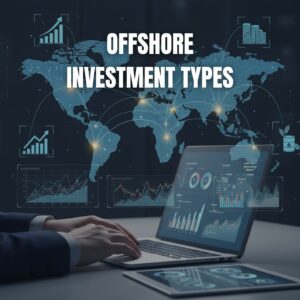Investors increasingly explore offshore options such as investment bonds to diversify globally, protect assets, and manage cross-border risks.
Understanding the types of offshore investment—from funds to stocks, real estate, and private equity—helps investors choose strategies that maximize returns while maintaining compliance.
This article covers:
- How does offshore investment work?
- What are the 8 types of offshore investment?
- What type of investment is usually considered the safest?
- Are offshore investments taxed?
- What are the pros and cons of offshore investing?
My contact details are hello@adamfayed.com and WhatsApp +44-7393-450-837 if you have any questions.
The information in this article is for general guidance only. It does not constitute financial, legal, or tax advice, and is not a recommendation or solicitation to invest. Some facts may have changed since the time of writing.

What are offshore investments?
Offshore investments are financial assets held in a jurisdiction outside your country of residence.
These investments are typically located in countries with favorable tax regimes, robust financial regulations, and political stability.
How many types of offshore investment are there?
Offshore investments can be broadly categorized into seven main types, though some investors may consider additional sub-categories.
These include:
- Offshore investment bonds
- Offshore investment funds
- Offshore investment stocks
- Offshore investment retirement savings
- Offshore investment real estate
- Offshore investment precious metals
- Offshore investment private equity
Offshore investment bond
An offshore investment bond is a life insurance-backed investment product that allows investors to hold a range of assets offshore under a single policy.
These bonds can provide tax deferral benefits, estate planning flexibility, and simplified reporting, but they often come with higher fees and less liquidity compared to direct investments.
They are also useful for investors looking to consolidate multiple investment holdings under one structure, making administration easier.
Additionally, they can be part of estate planning strategies, helping to transfer wealth efficiently across generations while potentially reducing inheritance taxes in certain jurisdictions.
Example: A UK expat might use a bond domiciled in Guernsey to hold global equities, bonds, and commodities under one policy, simplifying reporting and succession planning.
Offshore investment fund
An offshore investment fund pools money from multiple investors to invest in a diversified portfolio of global assets.
These funds can offer exposure to stocks, bonds, commodities, or multi-asset strategies, often managed by professional fund managers.
They allow investors to access international markets that might otherwise be difficult to enter, and often provide economies of scale in terms of lower trading costs and professional management.
Moreover, these funds can be structured to meet specific objectives, such as income generation, capital growth, or risk management across different markets.
Example: A Cayman Islands-based emerging markets fund investing in Asia and Latin America, giving investors exposure to high-growth economies while spreading risk across multiple companies and sectors.
Offshore investment stocks
Investing in offshore stocks allows investors to hold shares of international companies through offshore brokerage accounts.
This can enhance portfolio diversification and provide access to foreign growth markets.
Offshore stock investments also give the flexibility to invest in sectors or economies not available in your home country, potentially improving long-term returns.
However, they require careful monitoring of currency risks, political stability, and foreign market regulations that may impact investment performance.
Example: Buying shares of Tesla in the US or Tencent in Hong Kong through an offshore brokerage account to gain exposure to high-growth tech markets outside the investor’s domestic market.
Offshore investment retirement savings
Offshore retirement savings plans, such as certain expatriate pension schemes, allow individuals to accumulate retirement wealth outside their home country.
These plans may offer tax-efficient growth and the flexibility to transfer funds internationally.
They can be tailored to accommodate frequent relocations, currency changes, and differing retirement ages across countries, making them ideal for global professionals.
Additionally, some offshore retirement schemes allow for investment choice customization, enabling participants to align their portfolio with personal risk tolerance and retirement goals.
Example: A QROPS (Qualifying Recognized Overseas Pension Scheme) plan based in Jersey, allowing a UK expat to transfer their UK pension abroad and continue contributing while investing in global equities and bonds.
Offshore investment real estate

Investing in offshore real estate provides exposure to property markets abroad, which can offer rental income, capital appreciation, and portfolio diversification.
Popular markets include commercial, residential, and vacation properties in stable jurisdictions.
Real estate can serve as a tangible asset that hedges against currency depreciation and inflation in your home country.
Investors can also leverage properties to generate passive income or as part of a long-term wealth preservation strategy.
Example: Purchasing a residential apartment in Dubai for rental income and capital growth or investing in a commercial property in Singapore to diversify holdings outside the home country.
Offshore investment precious metals
Offshore precious metals investments include gold, silver, platinum, and other metals held in foreign jurisdictions.
These assets are often used as a hedge against inflation, currency risk, or geopolitical uncertainty.
Precious metals can provide a safe-haven element to an investment portfolio, preserving value when equities or bonds underperform.
Investors may hold them physically, in allocated accounts, or via certificates, each option affecting liquidity, storage costs, and risk exposure.
Example: Holding allocated gold bars in a Swiss vault or investing in a Singapore-based gold-backed fund to diversify a portfolio and protect against market volatility.
Offshore investment private equity
Offshore private equity allows investors to put capital into private companies abroad.
This type of investment can offer high returns but comes with higher risk, longer lock-in periods, and limited liquidity.
Private equity can also provide opportunities to participate in emerging markets or innovative sectors before they become publicly traded, potentially boosting portfolio growth.
Additionally, it often requires significant due diligence, professional management, and access to specialized networks to identify and monitor viable investment opportunities.
Example: Investing in a US-based startup via a Cayman Islands private equity fund or joining a European renewable energy project through an offshore limited partnership to benefit from potential high growth.
What is the safest offshore investment type?
Generally, offshore bonds or funds invested in government securities or blue-chip stocks are considered the safest offshore investment types due to lower volatility and strong regulatory oversight.
What is the most common type of offshore investment?
Offshore investment funds are the most prevalent form of investment offshore, accounting for a substantial portion of global offshore assets.
For instance, as of the first quarter of 2024, funds domiciled in the Cayman Islands represented 31.6% of the net assets of all private funds included in the US Securities and Exchange Commission’s data.
These funds offer diversified exposure and access to global markets without the need to manage individual assets.
They are particularly appealing to high-net-worth individuals and institutional investors seeking to optimize returns and manage risk across multiple jurisdictions.
In summary, offshore investment funds are not only the most common but also a strategic choice for investors aiming to diversify their portfolios and enhance financial flexibility.
Is offshore investment legal?
Yes, offshore investment is legal as long as you comply with tax reporting and regulatory requirements in your home country.
Transparency and proper disclosure are key to maintaining legality.
Is it worth investing offshore?
Investing offshore can be worthwhile for diversification, asset protection, and potential tax efficiency.
However, it requires meticulous planning, understanding of regulations, and professional advice to maximize benefits.
Offshore investments risks
Investing offshore carries risks such as currency fluctuations, along with legal, liquidity, and political risks that can impact returns and asset security.
- Regulatory and legal risk: Different jurisdictions have varying legal frameworks, investor protections, and reporting requirements. Changes in local laws or regulations can affect asset access, taxation, or ownership rights.
- Currency and exchange rate risk: Offshore assets are often denominated in foreign currencies, making investors exposed to fluctuations that can impact returns when converted back to their home currency.
- Liquidity risk: Certain offshore investments, such as private equity or real estate, may have long lock-in periods or limited secondary markets, making it difficult to access funds quickly.
- Political and economic risk: Political instability, economic downturns, or changes in government policy in the host country can adversely affect the value or safety of offshore assets.
- Tax compliance risk: Misunderstanding international tax obligations or failing to report assets correctly can lead to penalties, audits, or reputational issues offshore.
- Counterparty risk: Offshore investments often involve financial institutions or fund managers in other jurisdictions, creating potential exposure if these entities fail or mismanage funds.
Conclusion
Offshore investments offer access to global markets, diversification, and potential tax advantages, but they are not one-size-fits-all.
Understanding the types of offshore investments is key to selecting the right mix for your goals, risk appetite, and regulatory obligations.
Success depends on aligning your strategy with your investment horizon, and careful planning, professional guidance, and ongoing monitoring are essential to make offshore investing a strategic and effective part of a long-term wealth plan.
FAQs
Do you pay tax on offshore money?
Yes, in most countries you are required to report and pay tax on income, gains, or withdrawals from offshore investments, though some jurisdictions offer tax deferral or exemptions.
What is the difference between offshore and onshore investment?
Offshore investments are held outside your home country, often in tax-favorable jurisdictions, while onshore investments remain within your home country and are fully subject to local tax and regulations.
Are offshore trusts taxable?
Yes, offshore trusts can be subject to taxation depending on the settlor, beneficiary, and local laws of both the trust jurisdiction and your home country.
Proper planning can mitigate unnecessary tax exposure.
What is a disadvantage of an offshore investment bond?
A primary disadvantage of an offshore investment bond is having higher fees and limited liquidity, which can reduce returns and make it difficult to access funds quickly in case of financial emergencies.
Pained by financial indecision?

Adam is an internationally recognised author on financial matters with over 830million answer views on Quora, a widely sold book on Amazon, and a contributor on Forbes.



